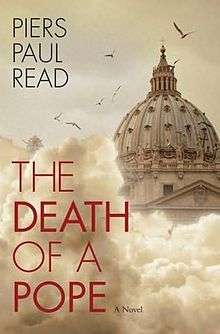The Death of a Pope

The Death of a Pope is a 2009 novel by prize-winning English writer Piers Paul Read. It is Read's fifteenth novel.
Plot
The story begins in London where a Basque ex-priest named Juan Uriarte is on trial, accused of attempting to purchase chemicals and plotting a terrorist attack. The trial is covered by an English reporter named Kate Ramsay. Uriarte's Catholic charitable outreach service is also suspected of being a front for radicals; however, Uriarte manages to avoid prosecution by claiming his intention was to eliminate the camels of a Muslim faction in Sudan. Not convinced, Ramsay becomes determined to undercover the truth and she travels with him to Uganda to see his charity's work first hand. In due course, she becomes attracted to Uriarte and offers to assist him with his plans. This works well for Uriarte, as he recruits her help, resulting in trips to Cairo and Rome. Ramsay is unaware of the actual purpose of these trips, but is sympathetic to Uriarte's convictions and she smuggles an illegal item into Rome, which she believes is a Coptic relic.
In the meantime, the story reveals an international conspiracy that is developing and is aimed at the Vatican. With the death of Pope John Paul II and the 2005 Papal conclave that elected Joseph Ratzinger as Pope Benedict XVI as a backdrop, a plot unfolds to destroy "the longest continuous government in the world — the Papacy".[1] It becomes apparent that the real purpose behind Uriarte's actions was to murder the Conservative faction of the Church and open a path for more Liberal-minded clergy to take control of the Church. Uriarte's plot is unknowingly foiled by Ramsay's uncle, a conservative priest from England.
Reception
Award-winning novelist Ron Hansen wrote: "Piers Paul Read has managed to combine sheer storytelling power with great learning and insight about the inner workings of the Church to fashion an entertainment of the highest order. If John le Carré took on Vatican politics, his book of suspense might aspire to be much like this one."[2]
Michael Coren began his review of The Death of a Pope with the claim: "If there were any justice in the world of letters, Piers Paul Read would be spoken of with Amis, Barnes, Rushdie and the rest of the dominant literary class wherever the great contemporary British novelists were mentioned." In The Death of a Pope, Coren noted, "Read is impressive but in some ways jarring in that he's prepared to give some of the best lines to the bad guys." But it is typical of a novelist of Read's quality "that the characters in black hats are deliciously ambivalent — though the author has a taut and trusted morality, he's too sophisticated to make his characters mere conduits for right and wrong. There is complexity here, confusion, a sing-song of lyrical paradox and good intentions leading to colossally evil acts. It's impossible, by the end of the book, to feel smugly satisfied that all is well with the world that Read has just shown us, and I suspect that is precisely what the man wants us to experience."[3]
References
- ↑ About The Death of a Pope
- ↑ Fantastic Fiction: Ron Hansen
- ↑ Michael Coren. Book Review: The Death of a Pope, by Piers Paul Read, The Afterword, July 11, 2009.